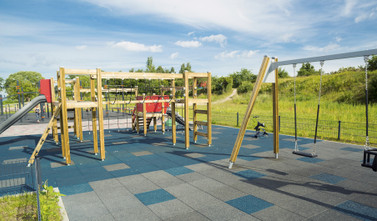 As a show of support and community outreach, the British Columbia Auto Association (BCAA) kicked off the BCAA Play Here competition earlier in 2018 to choose three playgrounds to revamp, with up to $100,000 in funds for each to refresh their park or school playground equipment. The winners were announced on June 21, 2018: Cache Creek Elementary School, École North Oyster School, and the Mackenzie Recreation Centre/John Dahl Park.
As a show of support and community outreach, the British Columbia Auto Association (BCAA) kicked off the BCAA Play Here competition earlier in 2018 to choose three playgrounds to revamp, with up to $100,000 in funds for each to refresh their park or school playground equipment. The winners were announced on June 21, 2018: Cache Creek Elementary School, École North Oyster School, and the Mackenzie Recreation Centre/John Dahl Park.
The groups who came close to a win during the competition but didn't make the top three finalists are understandably disappointed. Pinantan Elementary School is one such group. Like many declining playgrounds in North America, Pinantan's playground was built in the 1960s and has had little upkeep since due to low government funding. Playground equipment for schools can be quite expensive, and contests like this allow struggling playscapes to create a safer environment for the kids who play there. Elementary school playgrounds are particularly crucial since recess is not just a break from the school day; physical activity in young children also stimulates higher brain function and impacts their level of brain activity and motor skills even into adulthood.
Says Nikki Williams, a supporter of Pinantan Elementary during the BCAA competition: "No money has been spent by the school board on updating our playground in decades. What’s it going to take to have a proper, safe play structure put in at the school?...Would the school board rather spend money on a structure now or a future possible lawsuit?"
According to the local periodical Kamloops This Week, Pinantan's school district applied for and received money to upgrade a neighboring elementary school after provincial funding for playgrounds was reinstated this year, but Pinantan was still passed over.
Groups like BCAA who recognize the issue of expensive commercial playground and school playground equipment are doing a service to their community, but not necessarily helping to create long-term sustainability for these deserving play spaces. Plus, one group can only help so many playgrounds.
According to a recent audit, 70% of NYC Housing Authority (NYCHA) playgrounds are in 'unsatisfactory' or 'dangerous' condition. The neglect is likely due in part to low funding for most public housing, but NYCHA is being called out by residents and city officials for not yet coming up with a sustainable and cost-effective solution to make the playgrounds safe again.
This is particularly important in urban settings where safe places for outdoor play is limited. Nine out of 10 parents prefer that their children spend their childhood outdoors, yet on average children only get a little over four hours a week outside compared to the 8.2 hours a week their parents enjoyed on average as kids. These numbers can be even lower for children in urban settings with little greenery.
Public and
school playground equipment upkeep often goes by the wayside in order for other necessities to be funded, but that results in costly replacements of entire structures. To keep playgrounds cost effective even when funding is low, parks, schools, and cities can invest in replacement parts such as a new swing seat for when the old one gets cracked.
Having swing set replacement parts on hand doesn't just save money on buying a whole new structure, it also saves money and time spent on waiting for a professional to come and replace or re-patch the problem equipment. A small playground in Birmingham, AL called Railroad Park knows this all too well. While they contacted the manufacturer of a broken slide in their park back in February, as of a local news story published on June 19, 2018, the slide is still not expected to be repaired until at least July.
Repair kits for public and school playground equipment are made to be relatively inexpensive and easy options compared to equipment overhaul, and they may provide some much-needed autonomy for owners of playground equipment. While organizations like BCAA cannot support every needy playground, stories like that of Pinantan and NYC housing can help inspire a movement for better practices.
'BCAA Play Here' Competition Bolsters Desperate Playgrounds
Posted by Discount Playground Supply on Mar 1st 2019

